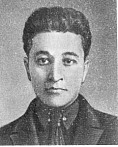Fayzulla Xoʻjayev
Fayzulla Ubaydullayevich Xo'jayev ( Cyrillic Файзулла Убайдуллаевич Хўжаев; Russian Файзулла Убайдуллаевич / Губайдуллаевич Ходжаев Fajsulla Ubajdullajewitsch Chodschajew ; persian فیضالله خواجه, DMG Faiżullāh Ḫwāǧa ; also Khodzhayev and Khojaev or Chodscha / Khoja ; * 1896 in Bukhara ; † March 13, 1938 in Moscow ) was a Soviet - Uzbek politician.
Life
Fayzulla Xoʻjayev was born in Buxoro as the son of the wealthy trader Ubaydulla Xoʻjayev . He received his basic training at a maktab , studied for two years at a madrasa in Buxora and learned from 1907 for five years in Moscow . After the death of his father in 1912 he returned to his parents' house in Buxora. Even before the October Revolution he joined the Jadidist movement and was one of the founding figures of the secret organization of the young Bucharians . As a result of the Russian Revolution, this group invited the Bolsheviks of the Tashkent Soviet to occupy Bukhara. However, this plan was unsuccessful, Xoʻjayev had to flee to Tashkent via Russia and was only able to return in 1920 after the flight of Alim Khan , the ruling emir of Bukhara . In 1920 and 1922 he was awarded the Order of the Red Banner .
Xo'jayev was appointed leader of the Bukhara People's Republic , but narrowly escaped an assassination attempt by the Basmati leader Enver Pasha . Xoʻjayev tried to establish economic ties with Europe. In 1923 he took part as a member of the People's Republic of Bukhara on the XII. KPR party conference in Moscow. After the territorial reorganization of Central Asia, Xo'jayev became chairman of the Council of People's Commissars of the Uzbek SSR and finally also chairman of the Central Executive Committee of the USSR .
He lost the latter two items on 17 June 1937 after the leadership of Joseph Stalin and the cotton - monocultures had criticized. At the head of the Uzbek SSR he was replaced by Abdullo Karimovich Karimov . Xo'jayev was tried in Moscow as a "right-wing Trotskyist " and on March 13, 1938 he was executed . During the trial, Xo'jayev stated that his goal was to achieve territorial independence in Turkestan , but negated anti-Russian or anti-Bolshevik motives.
Afterlife
In 1966, on the occasion of his 70th birthday, Xoʻjayev was officially rehabilitated.
In today's Uzbekistan, several monuments remind of his work, a station of the Tashkent Metro bears his name. That his father's house , where he lived until 1925, is a museum.
literature
- The Encyclopaedia of Islam . New Edition . Volume V. Leiden, EJ Brill, 1979.
- Paul Cocks, Robert Vincent Daniels, Nancy Whittier Heer: The Dynamics of Soviet Politics . Volume 76 of Russian Research Center Studies . Harvard University Press, 1976. ISBN 0674218817
- Shoshana Keller: To Moscow, not Mecca: The Soviet Campaign Against Islam in Central Asia, 1917–1941 . Greenwood Publishing Group, 2001. ISBN 0275972380
- Svatopluk Soucek: A History of Inner Asia . Cambridge University Press, 2000. ISBN 0521657040
Web links
- Steffen Dietzsch: Bukharin, Nikolai Iwanowitsch, Karl Radek et al. , in: Kurt Groenewold , Alexander Ignor, Arnd Koch (Eds.): Lexicon of Political Criminal Trials , Online, as of September 2015.
| personal data | |
|---|---|
| SURNAME | Xoʻjayev, Fayzulla |
| ALTERNATIVE NAMES | Хўжаев, Файзулла Убайдуллаевич |
| BRIEF DESCRIPTION | Uzbek politician |
| DATE OF BIRTH | 1896 |
| PLACE OF BIRTH | Bukhara |
| DATE OF DEATH | March 13, 1938 |
| Place of death | Moscow |
